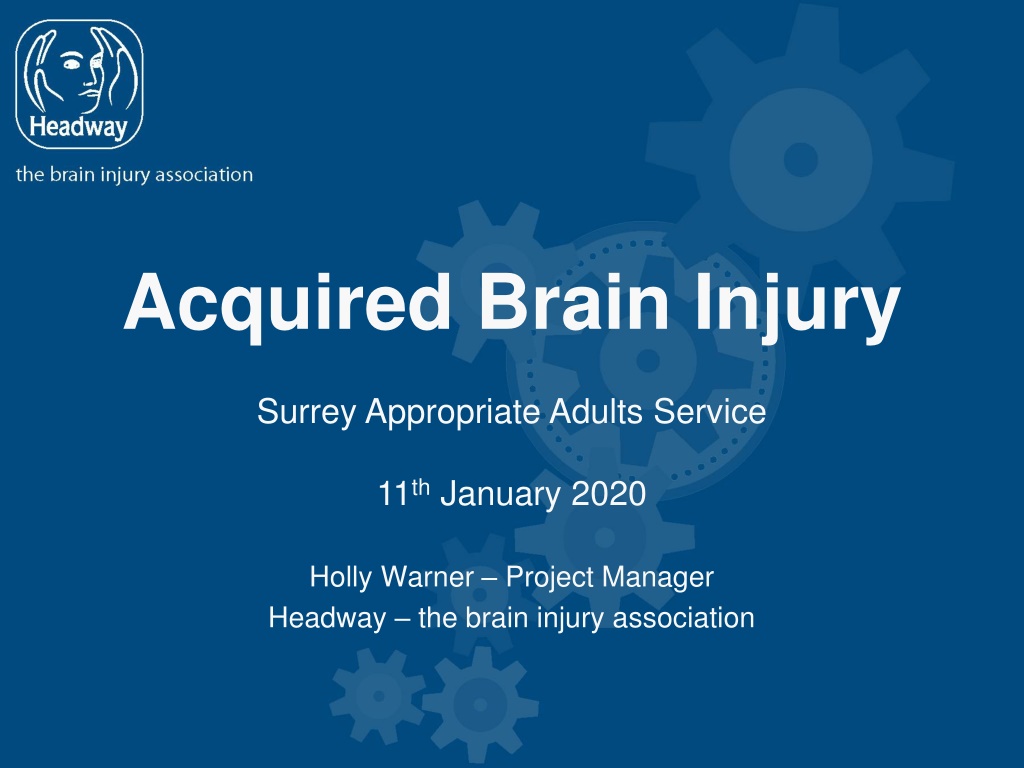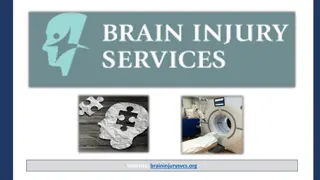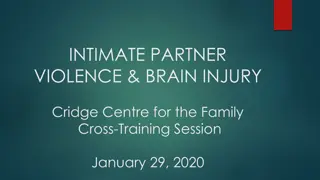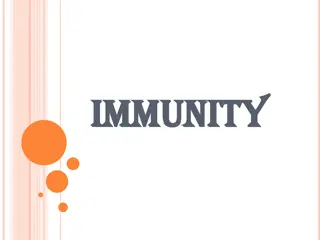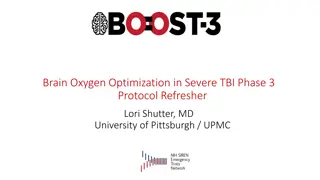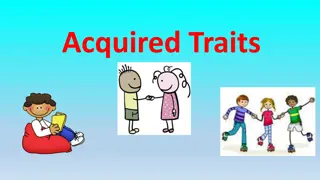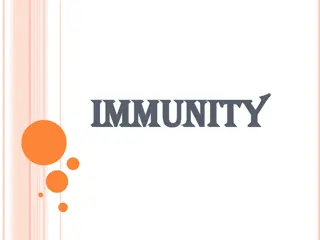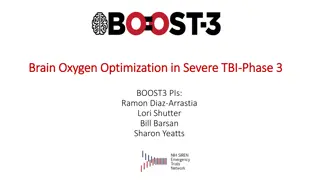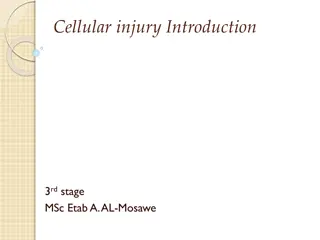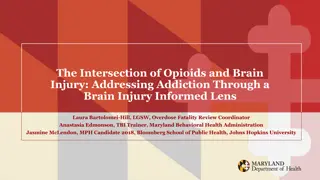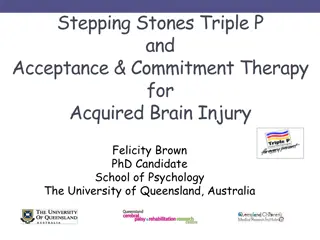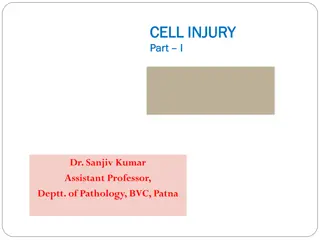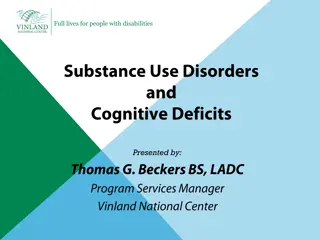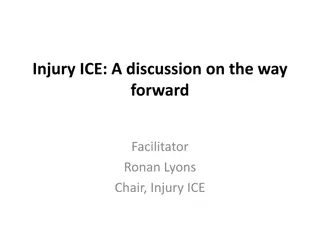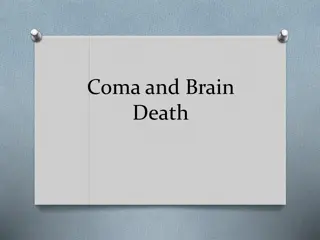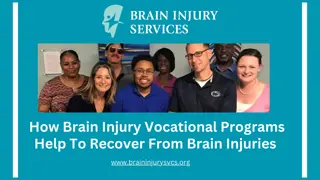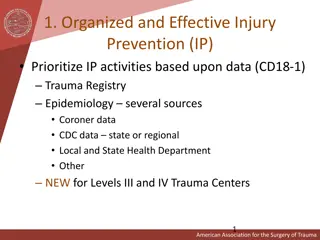Understanding Acquired Brain Injury: Facts, Challenges, and Stories
Acquired Brain Injury (ABI) is a complex condition that encompasses various causes such as traumatic brain injury, stroke, brain aneurysm, and more. This type of injury can lead to cognitive, physical, and communication difficulties, impacting individuals in profound ways. Survivors of ABI may face challenges in navigating daily life, interactions with the criminal justice system, and managing hidden disabilities that are not immediately apparent to others. Stories like Jamie's highlight the often misunderstood and overlooked aspects of living with ABI. Awareness, support, and understanding are crucial in aiding individuals with ABI to lead fulfilling lives.
Download Presentation

Please find below an Image/Link to download the presentation.
The content on the website is provided AS IS for your information and personal use only. It may not be sold, licensed, or shared on other websites without obtaining consent from the author. Download presentation by click this link. If you encounter any issues during the download, it is possible that the publisher has removed the file from their server.
E N D
Presentation Transcript
Acquired Brain Injury Surrey Appropriate Adults Service 11th January 2020 Holly Warner Project Manager Headway the brain injury association
Brain Injury Facts Over 350,000 ABI-related hospital admissions each year Acquired brain injury includes... Traumatic Brain Injury - falls, road traffic collisions, violent assaults One ABI admission every 90 seconds Stroke Brain Aneurysm Men are 1.6 times more likely than women to be admitted for a head injury Hypoxic brain injury Brain Tumour Admissions are increasing - faster in women Infection
Criminal Justice System A survivor of brain injury may come into contact with the Criminal Justice System in any of these ways: VICTIM WITNESS DEFENDANT
A Hidden Disability But you don t look disabled Huge array of presentations Fluctuation Lack of insight / awareness
Cognitive effects Executive Functions Memory Processing Attention & Concentration
Physical Effects Mobility including unsteady walking gait Speech including slurred speech Coordination Loss of sensation, taste and smell Headache Fatigue
Communication difficulties Language Impairment Speech Difficulties Cognitive Communication
Jamies story Jamie sustained his brain injury in a road traffic collision in 1994. Years later while driving home in heavy rain, he lost control of his car and crashed into a wall Jamie sustained a cut to his head and was found at the scene confused and disorientated common effects of his brain injury. Police mistakenly believed that he was driving under the influence of alcohol and arrested him Subsequently, Jamie was taken to court where the Judge found him not guilty and instructed that the costs of his defence should be met from the public purse Jamie said Just because a person may not have big scars or holes in their head, the authorities fail to believe the scale of the injury or impact of that injury. In my everyday routine I can communicate well. However when I am faced with stressful situations, I can appear drunk because I have difficulties processing information and answering questions.
Behavioural Effects Impulsivity Aggression & Irritability Disinhibition Perseveration
Example Charlie sustained his brain injury when he was just 9 years old as a result of falling off his bike As a result of his brain injury, Charlie often displays inappropriate behaviour and has lost his social filter : Making inappropriate sexual remarks and advances to women he finds attractive Making inappropriate comments about strangers' weight, clothing or appearance While, fortunately, Charlie hasn t come into contact with the police as a result of this behaviour, it causes a significant amount of embarrassment for Charlie s family and friends and in the wrong circumstance, could lead to further difficulties
Emotional Effects Lack of Confidence Lack of Motivation Anxiety Depression
The Justice Project Raise awareness of brain injury and its effects throughout the criminal justice system Help the police and others identify if someone they are in contact with has a brain injury Ensure brain injury survivors receive appropriate support Provide brain injury survivors with specialist legal advice and representation Divert people with brain injuries away from the criminal justice system where appropriate
Why? Published evidence from around the world indicates that there is high prevalence of offenders with brain injuries and that having a brain injury increases the risk of reoffending https://www.headway.org.uk/supporting-you/brain-injury-identity-card/brain injury-and-the-criminal-justice-system/
How? www.headway.org.uk/IDcard justiceproject@headway.org.uk
What we hope to achieve: Brain injury and its effects to be understood and taken into account by everyone involved in the criminal justice system Survivors committing serious crimes should face the consequences of their actions but those dealing with them should be fully aware of their deficits before making a decision Diversion from the criminal justice system where appropriate
Public launch HRH Prince Harry This surely is a life- changing moment for people with a brain injury, whether or not they ever get arrested
Benefits Helps police and others identify if someone has a brain injury Helps ensure that support is provided in these situations Access to a unique 24-hour legal helpline managed by a firm of solicitors that have received training in understanding brain injury Free of charge It can be used in many different, potentially difficult or emergency situations
What can you do? If you suspect a DP has a brain injury or they are in possession of a brain injury identity card: Ensure the DP understands what they are being asked, why they are in the situation and know their rights while in custody Ensure the DP is given adequate time to respond to questions and is spoken to calmly to avoid confusion and panic, assisting them with communication if required and Try to spot the signs of fatigue and ensure the DP is granted regular breaks during interviewing Check if the DP requires access to medication (i.e. anti-convulsants, anti-anxiety medication) or other medical attention while in custody Make them aware they can request specialist legal representation from solicitors that are trained in Understanding Brain Injury
Survey of ID card holders A survey of 1,304 cardholders generated 595 responses and the feedback was overwhelmingly positive 97%of respondents told us they thought their ID card was excellent or good 58% of respondents told us they had used their ID card 72% told us they have used their ID card in a social scenario setting 10% had used their card with the police 97% of respondents told us that when they used their ID card it was very helpful or helpful
Progress We have issued over 7,000 brain injury identity cards to survivors across the UK This includes over 1,200 in the South-East Training in Understanding Brain Injury has been delivered to: Metropolitan Police Mental Health Teams Surrey Police Custody officers Independent Custody Visitors in Surrey NHS England Liaison and Diversion Practitioners Crown Prosecution Service prosecutors National Appropriate Adults Network Public Prosecution Prosecutors (Northern Ireland) We have scheduled training for: Metropolitan Police Custody officers (Feb Apr 2020)
Questions? Get in touch: justiceproject@headway.org.uk 0208 640 8413
